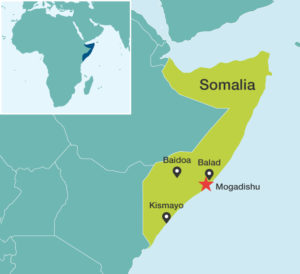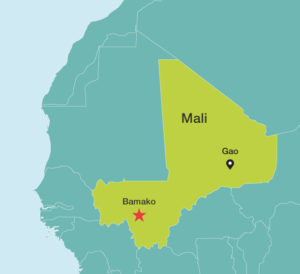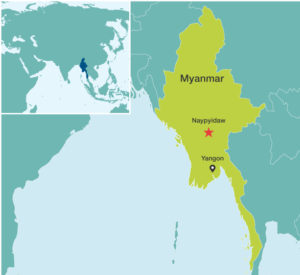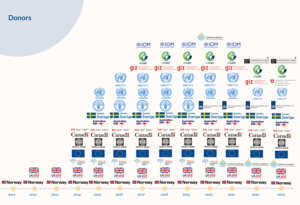Somalia

Following the fall of Siad Barre’s regime in 1991, Somalia descended into a state of continuous violent conflict, which has lasted for nearly 30 years. Initially, the fighting was between Clan-based militias and warlords, but these were swept aside by the Islamic Courts Union (ICU) in 2006. For most of 2006 the majority of south-central Somalia was controlled by the ICU, until they were removed by Ethiopian troops supporting the Transitional Federal Government (TFG) of Somalia by year’s end. In early 2007 the African Union Mission in Somalia (AMISOM) peacekeeping force was deployed to support the TFG and fight against the more radical wing of the ICU, al-Shabaab, which then evolved into the largest anti-government fighting force in the country over subsequent years. In August 2012, the first non-transitional government since 1991 was formed, The Federal Government of Somalia (FGS), following a long selection process involving Somalia’s different clans and the formation of a new Federal Parliament.
NIS established its presence in the capital Mogadishu in early 2012, during the final months of the TFG. Following a series of successful offensives by AMISOM against al-Shabaab in south-central Somalia, NIS worked closely with local communities and government institutions to quickly expand into the newly liberated areas to deliver tangible improvements in service delivery to conflict-affected communities. As one of few organisations with a Memorandum of Understanding with AMISOM, NIS works with the authorities and community leaders to deliver rapid and relevant projects to the communities previously living under al-Shabaab.
NIS’ first project in Somalia was the installation of solar-street lights along a key business road in the capital, Mogadishu. The immediate impact of the project on local residents and businesses was quickly recognised as evidence that non-emergency focussed stabilisation-style projects were possible in the country. This success saw NIS requested to install more streetlights in Mogadishu, but also to take on light infrastructure projects outside the capital in even higher-risk areas. Since 2012, NIS’ portfolio in Somalia has grown to over 80 projects, ranging from infrastructure projects such as roads, bridges, markets, stadiums, government buildings, solar electrification of hospitals and administration buildings and flood-defence, to managing the secondment of experts providing technical assistance to ministries, vocational training and sports programmes for youth and the design and implementation of a special financing facility to support the federal budget.
All these projects have brought significant and concrete changes to the daily lives of many conflict-affected communities in Somalia. Combined, these different projects are helping to build the momentum necessary for Somalia to successfully transition out of conflict and towards social and political stability. Building momentum through a broad spectrum of interventions aimed at helping communities and state institutions recover from conflict helps keep up people’s hopes for change and discourages people from supporting anti-government forces.
A key aspect of NIS’ work is the creation of platforms where the government can engage with the communities it serves to help restore the linkages and trust between government authorities, community leaders, and local populations. NIS has been able to document the positive effects these projects and community engagement activities have on peoples’ perception of government and the prospects for escaping conflict.
NIS’ donor partners in Somalia have included the Norwegian Ministry of Foreign Affairs, the UK Stabilisation Unit, the UK Rapid Delivery Fund, the EU, the Somalia Stability Fund, the Conflict Security Stability Fund, the World Bank, FAO, GIZ, IOM and the multi-donor Energising Development partnership (EnDev).
Mali

In 2012, the occupation of northern Mali by Tuareg separatists and militant Islamists, compounded by a military coup, plunged the country into a state of unprecedented political, social and economic turmoil. The crisis revealed the fragility of Mali’s institutions. In 2013, NIS established itself in Mali with the overall objective of working with the Malian authorities and local communities in newly liberated areas of the country, helping to to respond to the needs and expectations of conflict-affected populations. The rapid delivery of tangible results helps facilitate communities’ transition away from conflict in the short term, buying time for the longer-term implementation of the government’s Poverty Reduction and Recovery strategy.
Following consultations with local authorities and community representatives, NIS implemented its first project in Gao in northern Mali in 2014. The first project included 200 solar streetlights which illuminate public spaces, including schools, community centres, commercial districts, and water collection points, improving night-time security and enabling community-based activities to continue after sunset. This helps reduce crime and create a greater sense of social cohesion. Following this successful first project, NIS has continued with similar stabilisation efforts in northern and central Mali, installing a total of 554 solar streetlights in Gao, 144 in Bamba, Bourem, Tenenkou and Youwarou. NIS is currently working closely with the multi-donor initiative, Energising Development (EnDev) and national authorities on expanding its programme to include more poles, individual solar systems and help building agriculture infrastructures based on solar irrigation systems.
“Gao sera la ville lumière du Nord”
— Conseiller Communal
Donor partners in Mali include the Norwegian MFA, MINUSMA and EnDev. NIS’ partners have access to further facts and figures about our completed and ongoing projects on our Interface.
Myanmar

Myanmar has seen one of the world’s longest-lasting civil wars. The causes of conflict are numerous and intertwined. In 2011, the newly elected President Thein Sein, supported by chief peace envoy Minister U Aung Min, initiated a process of change towards peace. NIS has since the beginning of 2012 been involved with a number of key projects to support the peace process, which in turn will help stabilise the country.
Prior to the military take-over in February 2021, NIS was working to support social cohesion and the peace process at local, regional and national level.
As a result of political developments since February 2021, NIS programming inside the country has been paused and is currently under review.
Norway
In 2022, NIS started implementing its first project in Norway: Hva nå? Endringslaben. Endringslaben is a learning platform for children and youth, which aims to support and strengthen the work being carried out by Norwegian schools and teachers within the fields of sustainability and environmental education. The project is grounded in the Norwegian national curriculum (Kunnskapsløftet 2020), where sustainable development is identified as one of three cross-cutting topics. Endringslaben consists of a travelling exhibition which school classes are invited to visit, as well as in-class learning activities for use before and after the exhibition. Combined, they offer meaningful, inspiring opportunities for children and youth to learn more about environmental and social challenges being faced around the world today, and how they can be part of the solutions to overcoming these challenges. The exhibition is set up in local libraries across the country, and is also open to the general public. To date, NIS has implemented the project in 12 different municipalities, reaching almost 6,500 students and more than 300 teachers.
In 2024, NIS established a second project in Norway: Min by, mitt miljø – a summer school course delivered through and funded by Oslo municipality. Through fieldtrips and hands-on activities, the course gives students an opportunity to learn about challenges being faced by different ecosystems and meet people who are working to find solutions. In this way, course participants gain insight into, and practical experience with, different forms of work being done to promote sustainable use of nature and the environment. As part of the project, NIS collaborates with several partners, including researchers and environmental organisations.
More information about NIS’ projects in Norway is available here.








